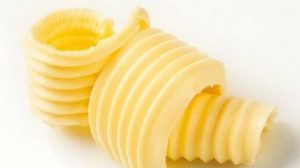Butter
This is one of a series of articles on food written by David Murray (see the full list on the right hand sidebar).
Why can’t we all just get along?
On the one hand, you have the butter-enthusiasts with their research-backed claims that butter is the way to go. And on the other, you have the margarine enthusiasts with their research-backed claims that margarine is the way to go. So who should you believe?
None of them.
You shouldn’t let someone else tell you what to put in your body. That is always your decision. A decision you should base on facts.
Ok, so let’s take a stroll in camp A. Butter. Why do people like it? One of butter’s major draw cards is that it is all natural. The production process is remarkably simple. You separate milk and take the fatty part, then you churn and churn and churn until Weird Al makes a song about you, and then … well, then you have butter. ‘Not like that synthesised rubbish,’ a butter enthusiast might tell you. It also tastes great! A fact that margarine has always had to contend with.
So why the haters?
Two words: fat and cholesterol. But it’s foolish to leave it at that. Butter has a high portion of saturated fat. So high in fact that a single serve (roughly a teaspoon) has about a third of all the fat you should eat a day. So if you make three sandwiches … well then you’ve likely overdone it. Saturated fats have been linked to major heart diseases and high LDL cholesterol (you know, the bad kind). But if you throw your memory back just one week, you’ll remember that we discussed this all last week. Since butter is made from milk, it has the same saturated fats. And not all saturated fats are the same.
Cross to camp B. Margarine. Why do people like it? It’s spreadable! Margarine is mostly made from vegetable oils. How much is mostly? 80%. Now if you’ve ever had any experience with oil at all, you’ll know that it doesn’t exactly hold a solid state very well. So it is hydrogenated to make it stay solid. While it still does have fats, they come from the oils and not from an animal. They are unsaturated fats, which do some good work on your innards by lowering your LDL cholesterol.
And what’s wrong with that?
Well, margarine is a completely manufactured product. As such, they tend to have additives and preservatives that many health-conscious people avoid. But it might be the hydrogenation process that turns off the most people. Hydrogenation in margarine creates trans fats, yet another variety that actually increases the LDL cholesterol levels.
People argue that trans fats in margarine outweigh saturated fats in butter.
But, the research proves both sides. One study might show that switching from saturated fats in butter to unsaturated fats in margarine reduces the risk of heart disease, and another might show that there is no difference at all. The important thing is balance and moderation, and do your own digging. But everyone agrees that it’s best to avoid trans fats. They are the common enemy here, and if you can’t find a margarine without it then you might be best switching to butter. At least you’ll know what you’re getting.
And if I catch you putting anything but butter on your crumpet, there’ll be trouble.

